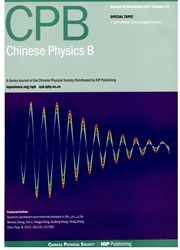

 中文摘要:
中文摘要:
Two methods of absorption imaging to detect cold atoms in a magnetic trap are implemented for a high-precision cold atom interferometer.In the first method,a probe laser which is in resonance with a cycle transition frequency is used to evaluate the quantity and distribution of the atom sample.In the second method,the probe laser is tuned to an open transition frequency,which stimulates a few and constant number of photons per atom.This method has a shorter interaction time and results in absorption images which are not affected by the magnetic field and the light field.We make a comparison of performance between these two imaging methods in the sense of parameters such as pulse duration,light intensity,and magnetic field strength.The experimental results show that the second method is more reliable when detecting the quantity and density profiles of the atoms.These results fit well to the theoretical analysis.
 英文摘要:
英文摘要:
Two methods of absorption imaging to detect cold atoms in a magnetic trap are implemented for a high-precision cold atom interferometer.In the first method,a probe laser which is in resonance with a cycle transition frequency is used to evaluate the quantity and distribution of the atom sample.In the second method,the probe laser is tuned to an open transition frequency,which stimulates a few and constant number of photons per atom.This method has a shorter interaction time and results in absorption images which are not affected by the magnetic field and the light field.We make a comparison of performance between these two imaging methods in the sense of parameters such as pulse duration,light intensity,and magnetic field strength.The experimental results show that the second method is more reliable when detecting the quantity and density profiles of the atoms.These results fit well to the theoretical analysis.
 同期刊论文项目
同期刊论文项目
 同项目期刊论文
同项目期刊论文
 A multi-objective optimization based fuzzy control?for nonlinear spatially distributed processes wit
A multi-objective optimization based fuzzy control?for nonlinear spatially distributed processes wit Low Loss Fusion Splicing Polarization-Maintaining Photonic Crystal Fiber and Conventional Polarizati
Low Loss Fusion Splicing Polarization-Maintaining Photonic Crystal Fiber and Conventional Polarizati Reduced phase error of a fiber optic gyroscope using a polarization maintaining photonic crystal fib
Reduced phase error of a fiber optic gyroscope using a polarization maintaining photonic crystal fib Heart Motion Prediction in Robotic-Assisted Beating Heart Surgery: A Nonlinear Fast Adaptive Approac
Heart Motion Prediction in Robotic-Assisted Beating Heart Surgery: A Nonlinear Fast Adaptive Approac Whirling modes stability criterion for a magnetically suspended flywheel rotor with significant gyro
Whirling modes stability criterion for a magnetically suspended flywheel rotor with significant gyro Effect of Radiation-induced Mean Wavelength Shift in Optical Fibers on Scale Factor of Interferometr
Effect of Radiation-induced Mean Wavelength Shift in Optical Fibers on Scale Factor of Interferometr A Quadratic Nonlinear Prediction-Based Heart Motion Model Following Control Algorithm in Robotic-Ass
A Quadratic Nonlinear Prediction-Based Heart Motion Model Following Control Algorithm in Robotic-Ass Precise braking torque control for attitude control flywheel with small inductance brushless DC moto
Precise braking torque control for attitude control flywheel with small inductance brushless DC moto Experimental investigation of pre-irradiation effect on radiation sensitivity of temperature sensing
Experimental investigation of pre-irradiation effect on radiation sensitivity of temperature sensing Experimental Study and Implementation of a Novel Digital Closed-Loop Control System for Coriolis Mas
Experimental Study and Implementation of a Novel Digital Closed-Loop Control System for Coriolis Mas Research on the Dynamic Calibration of Thermocouple and Temperature Excitation Signal Generation Met
Research on the Dynamic Calibration of Thermocouple and Temperature Excitation Signal Generation Met Distributed proportional plus second-order spatial derivative control for distributed parameter proc
Distributed proportional plus second-order spatial derivative control for distributed parameter proc Fuzzy output tracking control of semi-linear first-order hyperbolic PDE systems with matched perturb
Fuzzy output tracking control of semi-linear first-order hyperbolic PDE systems with matched perturb Data-based suboptimal neuro-control design with reinforcement learning for dissipative spatially dis
Data-based suboptimal neuro-control design with reinforcement learning for dissipative spatially dis Not Fully Overlapping Allan Variance and Total Variance for Inertial Sensor Stochastic Error Analysi
Not Fully Overlapping Allan Variance and Total Variance for Inertial Sensor Stochastic Error Analysi 期刊信息
期刊信息
